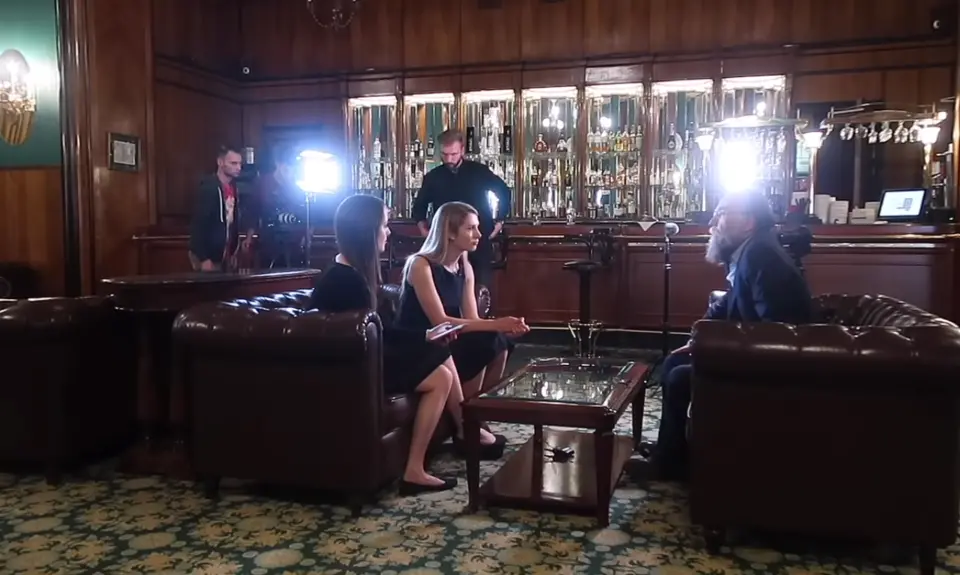Far-right pundits and activists, including Rebel Media’s Katie Hopkins and YouTube creators Lauren Southern and Brittany Pettibone, have decided to work to normalize Russia and its questionable-at-best human rights record to reinforce their nationalist anti-immigrant agenda.
Last week, a trio of far-right women landed in Russia, where they began producing video content aimed at normalizing the oppressive philosophies at work in modern Russia. Hopkins, for instance, touched down in Russia and immediately began showering praise on Russian President Vladimir Putin and celebrating that Russia had not been affected by multiculturalism.
A supporter of national identity, a defender of the Christian faith & ally of populists in Europe. Is Putin REALLY such a monster? #G7 #WorldCup #Putin pic.twitter.com/4txFD5KEjQ
— Katie Hopkins (@KTHopkins) June 9, 2018
“I do wonder, you know, about this idea of Putin being our enemy. He supports the Catholic faith. Over 85 percent of people here in St. Petersburg are Orthodox or Catholic or Christian. He also supports being Russian. Eighty-five percent of people here identify as being strongly Russian first. And he’s also very supportive of populists in Europe,” Hopkins said.
She added, “Perhaps, after all, Putin is not the monster we’ve made him out to be.”
Hopkins also took time to fangirl over the Russian subway system and remark that “the West has quite a lot to learn from Russia” because she did not observe people in the streets eating while walking or using their cell phones. On Twitter, Hopkins wrote it was a joy to be in St. Petersburg because it was a “place untouched by the myth of multiculturalism and deranged diversity”:
A joy to be in St Petersburg. A place untouched by the myth of multiculturalism and deranged diversity. #Putinrocks.
— Katie Hopkins (@KTHopkins) June 7, 2018
Similarly—although not publicly tied to Hopkins—Southern and Pettibone have also traveled to Russia, where they’ve so far interviewed Aleksandr Dugin, a neo-fascist Russian political theorist who advocates for “Eurasianism,” which is a fancy way of saying that he advocates for Russian expansion across Europe and Asia via military force in order to preserve Russia as a “civilizational entity.” If that sounds familiar, it’s because far-right groups in Europe and America including Generation Identity and Identity Evropa have adopted similar rhetoric about preserving Western culture when propagandizing against immigration. Given Southern and Pettibone’s tie-ins with far-right activists in Europe, it’s not incredibly surprising they would embrace Dugin’s philosophy and choose to present it unskeptically.
Southern, apparently anticipating backlash for interviewing Dugin, tried to get ahead of public criticism in a video she titled, “Who is Aleksandr Dugin?” In the video, Southern argues that presenting Dugin’s violent philosophies as legitimate “new arguments” in the public sphere is crucial for those who enjoy “thought and debate.”
“For those involved in the more esoteric circles of political thought, Dugin will almost certainly ring a bell, maybe even some alarm bells, as the man is known to be a very dangerous thinker of sorts. Even amongst those who claim to love free speech and thought and debate, he is a pariah,” Southern said.
She later adds, “But here’s the crux of it all. If individualists and liberals appreciate free speech and free dialogue, if we like free ideas and criticism so much—and any man who claims he is open to all ideas and is willing to debate any topic should embrace Professor Dugin—not necessarily his ideas, but should embrace Professor Dugin just for consideration of his arguments, not least of all because he is well-educated, well-read and articulate, but because he brings forth new arguments even if we do not like them.”
But the first clip in the interview series is devoid of any intellectual rigor. As ThinkProgress reporter Casey Michel rightly points out, the interview is a series of softball questions that steer clear of Dugin’s neo-fascist beliefs in favor of questions like, “Mr. Dugin, what would you say are the most important challenges that are facing the Millennial generation today, particularly within the Western world?”
When Dugin begins speaking with Pettibone and Southern about a “second wave of replacement” on the horizon, claiming that the first replacement was “by refugees and immigrants of the traditional population” in the West, the motivations behind the interview begin to become less opaque. Last year, Pettibone and Southern boarded a ship dedicated to targeting search-and-rescue boats helping to save the lives of refugees in the Mediterranean.
In a post-interview video uploaded to Pettibone's channel, the duo praised Dugin's straightforwardness when talking about "identity or returning to traditional roots or the great replacement—things that if you mention these in America or Canada, it's like, whoa, suddenly it's like, too spicy."





